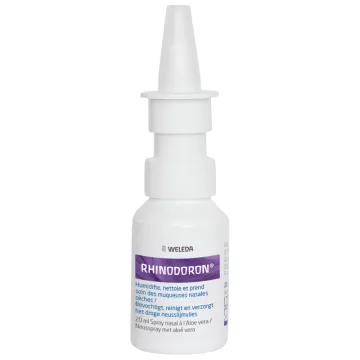


What is the nasal mucosa and how important is it to the respiratory system?
The nasal mucosa is a layer of tissue that lines the inside of the nose. Mainly composed of epithelial cells and secretory glands, it plays a crucial role in protecting and maintaining the respiratory system. Its primary function is to filter, humidify and warm inhaled air before it reaches the lungs. Rich in blood vessels and nerves, the nasal mucosa also plays an essential role in odor detection and the immune response against pathogens.
How does the nasal mucosa contribute to the body's defense system?
The nasal mucosa has several defense mechanisms to protect the body against infection and foreign particles. Firstly, the mucus produced by the glands in the mucosa captures microbes and dust particles. Secondly, cilia, small hair-like structures, constantly sweep mucus and debris towards the nasal outlet, facilitating their expulsion. Finally, the nasal mucosa contains specialized immune cells that identify and attack pathogens.
What medical conditions can affect the nasal mucosa?
Several disorders can disrupt the normal functioning of the nasal mucosa. Among them, rhinitis, which can be allergic or non-allergic, causes inflammation of the mucosa, leading to symptoms such as congestion, runny nose, sneezing and itching. Sinusitis, an inflammation or infection of the sinuses, can also indirectly affect the nasal mucosa by blocking the normal drainage of mucus. Other conditions such as colds, flu and bacterial infections can also impact this mucosa.
What are the best ways to maintain a healthy nasal mucosa?
To maintain the health of the nasal mucosa, several measures can be adopted:
How does climate change affect the nasal mucosa?
Climate change can affect the health of the nasal mucosa in a number of ways. Increased air pollution can raise the level of irritants and allergens in the atmosphere, leading to inflammatory reactions in the mucosa. In addition, changes in temperature and humidity can affect the ability of the nasal mucosa to filter and humidify the air properly, increasing the risk of respiratory infections.
How are nasal mucosa problems diagnosed?
Diagnosis of problems affecting the nasal mucosa usually begins with a physical examination, including inspection of the nose with an instrument called a nasoscope. Additional tests may include allergology to identify possible allergic reactions, mucus cultures to detect infections, and sometimes magnetic resonance imaging (MRI) to examine nasal structures in detail. These assessments help to identify the underlying causes of nasal symptoms and to develop an appropriate treatment plan.
What treatments are available for nasal mucosa disorders?
Treatments vary according to the nature and severity of the condition. For allergic rhinitis, antihistamines and nasal corticoids are often prescribed to reduce inflammation and control symptoms. For infections, antibiotics may be necessary. For chronic or severe conditions, surgical procedures such as septoplasty (correction of the nasal septum) or turbinectomy (reduction of the turbinates) may be considered to improve breathing.
Are there significant differences in the nasal mucosa between children and adults?
Yes, there are anatomical and functional differences between children and adults. In children, the nasal mucosa is generally more sensitive and reactive, making them more susceptible to infections such as frequent colds and otitis media. What's more, as their immune systems are still developing, they may have a stronger reaction to allergens. It is therefore crucial to carefully monitor and manage nasal health in young people.
What impact can stress have on the nasal mucosa?
Stress can have a significant impact on the nasal mucosa, mainly by weakening local immune defenses, thus increasing vulnerability to infection. In addition, stress can lead to altered breathing patterns (often faster and more superficial), affecting the mucosa's ability to filter and humidify air effectively. Studies have shown that chronic stress can even influence mucus secretion, making the nasal mucosa drier and more susceptible to irritation.
How does nutrition influence the health of the nasal mucosa?
Nutrition plays a crucial role in the health of the nasal mucosa. A diet rich in vitamins A and C, as well as omega-3, can help maintain the integrity of the mucosa and boost its immune functions. Vitamins A and C, in particular, are essential for tissue repair and fighting infection. In addition, good hydration is vital, as it helps maintain mucus moisture, facilitating its ability to trap particles and pathogens.